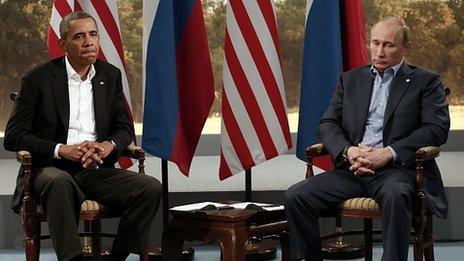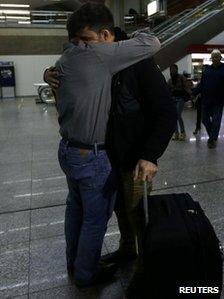Edward Snowden: Timeline
- Published

Edward Snowden first emerged in Hong Kong before flying to Moscow
Edward Snowden, a former Central Intelligence Agency technical worker, is the source of one of the worst information leaks in US history. Materials provided by Mr Snowden to the media allege the US has conducted widespread and illegal surveillance of its citizens and other nations. The BBC looks at how the affair has developed since it broke in June.
Scandal starts
6 June 2013: Guardian journalist Glenn Greenwald reports the US National Security Agency (NSA) is collecting the telephone records, external of millions of Verizon customers under a top secret court order granting the government unlimited authority to obtain communications data for a three-month period.
7 June: The Guardian and Washington Post, external report the NSA is accessing the systems of US internet giants including Google and Facebook, and collecting data under a previously undisclosed surveillance programme called Prism. The programme allows officials to collect material including emails, live chats and search histories.
8 June: US President Barack Obama says the government surveillance programmes strike "the right balance" between security and privacy and are closely overseen by Congress and the courts.
Snowden named and in Hong Kong
9 June: Edward Snowden, 29, is named as the source of the intelligence leaks. Speaking from Hong Kong, external, he explains why he went public.
10 June: Mr Snowden checks out of his Hong Kong hotel and his whereabouts remain unknown as it is rumoured the US is pursuing a criminal investigation against him.
11 June: The EU demands US assurances that Europeans' rights are not being infringed by the newly-revealed surveillance programmes. Mr Snowden's employer, defence contractor Booz Allen Hamilton, says it has fired the infrastructure analyst for violating its ethics code.
12 June: Mr Snowden tells the South China Morning Post from a secret location in Hong Kong that he will fight any attempt to extradite him. The Speaker of the US House of Representatives John Boehner describes him as a traitor. The UK assures US and British citizens their intelligence agencies are operating within the law.
13 June: Mr Snowden says the US government has been hacking computers in mainland China and Hong Kong for years, external. NSA Director Keith Alexander tells the US Senate that surveillance programmes have disrupted dozens of terror plots.
14 June: FBI Director Robert Mueller says Mr Snowden has caused the US "significant harm" and tells Congress the US will hunt him down and prosecute him.
15 June: Hundreds of protesters march on the US consulate in Hong Kong, demanding local authorities protect Mr Snowden.
17 June: Mr Snowden denies he is a Chinese agent and says US officials, in labelling him a traitor, have destroyed any possibility of a fair trial.
18 June: Mr Snowden's father, Lon, issues a public plea urging his son to not commit "treason".
19 June: NSA Director Alexander tells the US House intelligence committee the surveillance programmes leaked by Mr Snowden helped thwart 50 attacks since 2001.
From Hong Kong to Moscow
20 June: Wikileaks founder Julian Assange attempts to broker a deal to grant Mr Snowden asylum in Iceland.
22 June: US prosecutors file a criminal complaint, charging Mr Snowden with espionage and theft. The White House requests his extradition from Hong Kong.
23 June: Mr Snowden flies from Hong Kong to Moscow as extradition pressure builds. Ecuador's foreign minister confirms on Twitter that Mr Snowden has requested asylum there. Ecuador has an extradition treaty with the US but allows for political asylum exemptions, and has sheltered Mr Assange in its London embassy for the past year.
24 June: White House spokesman Jay Carney urges Russia to return Mr Snowden, and says the manner of his departure from Hong Kong would "unquestionably impact" on US relations with China.

Relations between the US and Russia were already tense on 17 June
25 June: China describes US accusations that it facilitated the departure of Mr Snowden from Hong Kong as "groundless and unacceptable". Russian President Vladimir Putin confirms Mr Snowden is in the transit area of Moscow's Sheremetyevo airport and remains a free man. US Secretary of State John Kerry requests Russia transfer the "fugitive of justice" to the United States.
27 June: Ecuador warns it could take weeks to rule on Mr Snowden's asylum bid.
28 June: Mr Snowden's father, Lon, ask US Attorney General Eric Holder for "ironclad assurances" his son's rights will be protected should he return to the US.
29-30 June: Germany's Der Spiegel magazine says it has seen a secret document provided by Mr Snowden showing the US bugged EU offices in Washington and at UN headquarters in New York. European officials demand "full clarification" from the US.
Snowden's bids for asylum

Edward Snowden is seen for the first time in three weeks on 12 July
1 July: Mr Snowden applies to Russia for political asylum; President Putin says he should stop leaking US secrets if he wants to stay. President Obama acknowledges "high-level" discussions with Moscow on extradition.
2 July: Mr Snowden withdraws his asylum request to Russia and sends requests to 20 other countries, according to Wikileaks.
3-5 July: Bolivian President Evo Morales' plane is diverted to Austria amid suspicion that Mr Snowden is on board. President Morales threatens to close the US embassy in Bolivia in response.
6 July: Nicaragua and Venezuela offer Mr Snowden asylum.
12 July: Mr Snowden emerges at Sheremetyevo airport for the first time in three weeks, saying he sought asylum in Russia as he was unable to travel to Latin America.

Glenn Greenwald greets Mr Miranda as he arrives in Brazil on 19 August
1 August: Mr Snowden leaves the airport and enters Russian territory after applying for temporary asylum. The US says Russia's decision is "extremely disappointing".
7-9 August: President Obama cancels a meeting with Russian President Putin following Russia's asylum decision. He promises "appropriate reforms" to guarantee greater oversight of US surveillance programmes.
16 August: Citing documents leaked by Mr Snowden, the Washington Post reports the NSA broke privacy rules and overstepped its legal authority thousands of times in the past two years.
19-20 August: Mr Greenwald's partner, David Miranda, is detained under terror laws at London's Heathrow airport for nine hours on his way to Rio de Janeiro. The Brazilian citizen reportedly has his mobile phone, laptop, DVDs and other items seized. UK politicians demand an explanation. The US denies involvement but acknowledges it was given a "heads-up" from British officials about the detention.
- Published16 December 2013
- Published17 January 2014
- Published1 July 2013
- Published26 June 2013